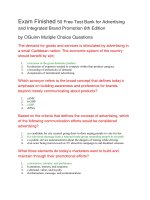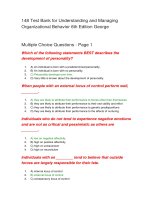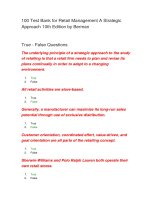Test bank for maternity and womens health care 10th edition lowdermilk
Bạn đang xem bản rút gọn của tài liệu. Xem và tải ngay bản đầy đủ của tài liệu tại đây (65.01 KB, 10 trang )
buy this full document at
Lowdermilk: Maternity & Women's Health Care, 10th Edition
Chapter 01: 21st Century Maternity and Women’s Health Nursing
Test Bank
MULTIPLE CHOICE
1.
a.
b.
c.
d.
To assess a mother’s risk of having a low-birth-weight (LBW) infant, what is the most
important factor for the nurse to consider?
African-American race
Cigarette smoking
Poor nutritional status
Limited maternal education
ANS: A
For African-American births, the incidence of LBW infants is twice that of Caucasian births.
Race is a nonmodifiable risk factor.
Cigarette smoking is an important factor in potential infant mortality rates, but it is not the
most important. Additionally, smoking is a modifiable risk factor.
Poor nutrition is an important factor in potential infant mortality rates, but it is not the most
important. Additionally, nutritional status is a modifiable risk factor.
Maternal education is an important factor in potential infant mortality rates, but it is not the
most important. Additionally, maternal education is a modifiable risk factor.
DIF: Cognitive Level: Comprehension
REF: 5
OBJ: Client Needs: Health Promotion and Maintenance: Antepartum Care
TOP: Nursing Process: Assessment
2.
a.
b.
c.
d.
What is the primary role of practicing nurses in the research process?
Designing research studies
Collecting data for other researchers
Identifying researchable problems
Seeking funding to support research studies
ANS: C
When problems are identified, research can be conducted properly. Research of health care
issues leads to evidence-based practice guidelines.
Designing research studies is only one factor of the research process.
Data collection is one factor of research.
Financial support is necessary to conduct research, but it is not the primary role of the nurse
in the research process.
DIF: Cognitive Level: Comprehension
REF: 14
OBJ: Client Needs: Safe and Effective Care Environment
TOP: "Nursing Process: Diagnosis, Evaluation"
buy this full document at
Full file at />3.
a.
b.
c.
d.
The nurse should be aware that a statistic widely used to compare the health status of
different populations is the:
Incidence of specific infections, such as acquired immunodeficiency syndrome
(AIDS) and tuberculosis
Infant mortality rate
Maternal morbidity rate
Incidence of low-birth-weight (LBW) infants
ANS: B
City, county, and state health departments provide annual reports of births and deaths.
Maternal and infant death rates are particularly important because they reflect health
outcomes that may be preventable. Infant mortality continues to be a concern in all
populations.
AIDS and tuberculosis may be the target of research studies; however, maternal and infant
mortality rates are particularly important in the evaluation of the health of a population.
The number of maternal deaths in the United States is small; however, worldwide many
women die each year from problems related to pregnancy and childbirth.
The incidence of LBW infants is monitored in order to determine risk factors such as racial
disparity. It is not as widely used as infant mortality.
DIF: Cognitive Level: Knowledge
REF: 5
OBJ: Client Needs: Health Promotion and Maintenance
TOP: Nursing Process: Assessment
4.
a.
b.
c.
d.
Alternative and complementary therapies:
Replace conventional Western modalities of treatment
Are used by only a small number of American adults
Allow for more client autonomy
Focus primarily on the disease an individual is experiencing
ANS: C
City, county, and state health departments provide annual reports of births and deaths.
Maternal and infant death rates are particularly important because they reflect health
outcomes that may be preventable. Infant mortality continues to be a concern in all
populations.
Alternative and complementary therapies are part of an integrative approach to health care.
An increasing number of American adults are seeking alternative and complementary health
care options.
Alternative healing modalities offer a holistic approach to health, focusing on the whole
person and not just the disease.
DIF: Cognitive Level: Comprehension
OBJ: Client Needs: Physiologic Integrity
TOP: Nursing Process: Planning
REF: 3
Mosby items and derived items © 2012, 2007, 2006 by Mosby, Inc., an affiliate of Elsevier Inc.
Full file at />5.
a.
b.
c.
d.
The nurses working at a newly established birthing center have begun to compare their
performance in providing maternal-newborn care against clinical standards. This
comparison process, designed to improve the quality of client care, is called:
Best practices network
Clinical benchmarking
Outcomes-oriented care
Evidence-based practice
ANS: C
Outcomes-oriented care measures effectiveness of interventions and quality of care against
benchmarks or standards.
The term best practice refers to a program or service that has been recognized for excellence.
Clinical benchmarking is a process used to compare one’s own performance against the
performance of the best in an area of service.
The term evidence-based practice refers to the provision of care based on evidence gained
through research and clinical trials.
DIF: Cognitive Level: Comprehension
REF: 11
OBJ: Client Needs: Safe and Effective Care Environment
TOP: Nursing Process: Evaluation
6.
a.
b.
c.
d.
Contemporary maternity nursing is exemplified by:
The use of midwives for all vaginal deliveries
Family-centered care
Free-standing birth clinics
Physician-driven care
ANS: B
Contemporary maternity nursing focuses on the family’s needs and desires.
Midwives and physicians both perform vaginal deliveries.
Free-standing clinics are an example of alternative birth options.
Contemporary maternity nursing is driven by the relationship between nurses and their
clients.
DIF: Cognitive Level: Comprehension
REF: 8
OBJ: Client Needs: Health Promotion and Maintenance
TOP: Nursing Process: Planning
7.
A 38-year-old Hispanic woman delivered a 9-lb, 6-oz baby girl vaginally after being in
labor for 43 hours. The baby died 3 days later from sepsis. On what grounds could the
woman have a legitimate legal case for negligence?
a. She is Hispanic.
b. She delivered a girl.
c. If the standards of care were not met.
d. She refused fetal monitoring.
ANS: C
Mosby items and derived items © 2012, 2007, 2006 by Mosby, Inc., an affiliate of Elsevier Inc.
Full file at />Not meeting the standards of care is a legitimate factor for a case of negligence.
The client’s race is not a factor for a case of negligence.
The infant’s gender is not a factor for a case of negligence.
Although fetal monitoring is the standard of care, the client has the right to refuse treatment.
This refusal is not a case for negligence, but informed consent should be properly obtained,
and the client should sign an against medical advice form for refusal of any treatment that is
within the standard of care.
DIF: Cognitive Level: Analysis
REF: "11, 12"
OBJ: Client Needs: Safe and Effective Care Environment
TOP: Nursing Process: Implementation
8.
a.
b.
c.
d.
The National Quality Forum has issued a list of “never events” pertaining specifically to
maternal and child health. These include all except:
Infant discharged to the wrong person
Kernicterus associated with failure to identify and treat hyperbilirubinemia
Artificial insemination with wrong donor sperm or egg
Foreign object retained after surgery
ANS: D
Although a foreign object retained after surgery is a never event, this does not pertain
specifically to obstetric clients. A client undergoing any type of surgery may be at risk for
this event.
An infant discharged to the wrong person pertains specifically to postpartum care.
Death or serious disability as a result of kernicterus pertains to newborn assessment and care.
Artificial insemination affects families seeking care for infertility.
DIF: Cognitive Level: Knowledge
REF: 4
OBJ: Client Needs: Safe and Effective Care Environment
TOP: Nursing Process: Implementation
9.
a.
b.
c.
d.
An important development that concerns maternity nursing is integrative health care,
which:
Seeks to provide the same health care for all racial and ethnic groups
Blends complementary and alternative therapies with conventional Western
treatment
Focuses on the disease or condition rather than the client’s background
Has been mandated by Congress
ANS: B
Integrative health care tries to mix the old with the new at the discretion of the client and
health care providers.
Integrative health care is a blending of new and traditional practices.
Integrative health care focuses on the whole person, not just the disease or condition.
U.S. law supports complementary and alternative therapies but does not mandate them.
Mosby items and derived items © 2012, 2007, 2006 by Mosby, Inc., an affiliate of Elsevier Inc.
Full file at />DIF: Cognitive Level: Knowledge
REF: 3
OBJ: Client Needs: Physiologic Integrity
TOP: Nursing Process: Planning
10. A nurse caring for a pregnant client should be aware that the U.S. birth rate shows what
trend?
a. Births to unmarried women are more likely to have less favorable outcomes.
b. Birth rates for women 40 to 44 years of age are declining.
c. Cigarette smoking among pregnant women continues to increase.
d. The rates of pregnancy and abortion among teens are lower in the United States
than in any other industrialized country.
ANS: A
Low-birth-weight infants and preterm birth are more likely because of the large number of
teenagers in the unmarried group.
Birth rates for women in their early 40s continue to increase.
Fewer pregnant women smoke.
Teen pregnancy and abortion rates are higher in the United States than in any other industrial
country.
DIF: Cognitive Level: Comprehension
OBJ: Client Needs: Psychosocial Integrity
TOP: Nursing Process: Assessment
REF: 5
11. The high cost of health care in the United States is most likely a result of:
a. Early postpartum discharge policies
b. Midwifery care
c. The involvement of nurses in the politics of cost containment
d. An emphasis on the use of advanced technology in care
ANS: D
The use of advanced technology in care increases costs. Caring for the increased number of
low-birth-weight infants in neonatal intensive care unit (NICU) settings contributes
significantly to increased health care costs.
Early discharges reduce costs.
Midwifery care reduces costs.
Involvement of nurses should ameliorate costs.
DIF: Cognitive Level: Comprehension
REF: 4
OBJ: Client Needs: Safe and Effective Care Environment
TOP: Nursing Process: Assessment
12. Maternity nursing care that is based on knowledge gained through research and clinical
trials is:
Mosby items and derived items © 2012, 2007, 2006 by Mosby, Inc., an affiliate of Elsevier Inc.
Full file at />a.
b.
c.
d.
Derived from the Nursing Intervention Classification
Known as evidence-based practice
At odds with the Cochrane School of traditional nursing
An outgrowth of telemedicine
ANS: B
Evidence-based practice is based on knowledge gained from research and clinical trials.
The Nursing Intervention Classification is a method of standardizing language and
categorizing care.
Dr. Cochrane systematically reviewed research trials and is part of the evidence-based
practice movement.
Telemedicine uses communication technologies to support health care.
DIF: Cognitive Level: Comprehension
REF: 9
OBJ: Client Needs: Safe and Effective Care Environment
TOP: Nursing Process: Diagnosis
13. The level of practice a reasonably prudent nurse provides is called:
a. The standard of care
b. Risk management
c. A sentinel event
d. Failure to rescue
ANS: A
Guidelines for standards of care are published by various professional nursing organizations.
Risk management identifies risks and establishes preventive practices, but it does not define
the standard of care.
Sentinel events are unexpected negative occurrences. They do not establish the standard of
care.
Failure to rescue is an evaluative process for nursing, but it does not define the standard of
care.
DIF: Cognitive Level: Knowledge
REF: 12
OBJ: Client Needs: Safe and Effective Care Environment
TOP: Nursing Process: Implementation
14. During a prenatal intake interview, the client informs the nurse that she would prefer a
midwife to provide both her care during pregnancy and deliver her infant. What
information is most appropriate for the nurse to share with this client?
Mosby items and derived items © 2012, 2007, 2006 by Mosby, Inc., an affiliate of Elsevier Inc.
Full file at />a. Midwifery care is only available to clients who are uninsured because their
services are less expensive than an obstetrician. Costs are often lower than an
obstetric provider.
b. The client will receive fewer interventions during the birth process.
c. She should be aware that midwives are not certified.
d. Her delivery can take place only at home or in a birth center.
ANS: B
This client will be able to participate actively in all decisions related to the birth process and
is likely to receive fewer interventions during the birth process.
Midwifery services are available to all low risk pregnant women, regardless of the type of
insurance they have.
Midwifery care in all developed countries is strictly regulated by a governing body that
ensures that core competencies are met. In the United States, this body is the American
College of Nurse-Midwives (ACNM).
Midwives can provide care and delivery at home, in freestanding birth centers, and in
community and teaching hospitals.
DIF: Cognitive Level: Comprehension
REF: 8
OBJ: Client Needs: Safe and Effective Care Environment
TOP: Nursing Process: Planning
15. While obtaining a detailed history from a woman who has recently immigrated from
Somalia, the nurse realizes that the client has undergone female genital mutilation. The
nurse’s best response to this client is:
a. “This is a very abnormal practice and rarely seen in the United States.”
b. “Are you aware of who performed this so that it can be reported to the
authorities?”
c. “We will be able to fully restore your circumcision after delivery.”
d. “The extent of your circumcision will affect the potential for complications.”
ANS: D
The extent of the circumcision is important. The client may experience pain, bleeding,
scarring, or infection and may require surgery prior to childbirth.
Although this practice is not prevalent in the United States, it is very common in many
African and Middle Eastern countries for religious reasons. Mentioning that the practice is
abnormal and rarely seen in the United States is culturally insensitive.
The infibulation may have occurred during infancy or childhood. The client will have little to
no recollection of the event. She would have considered this to be a normal milestone during
her growth and development.
The International Council of Nurses has spoken out against this procedure as harmful to a
woman’s health.
DIF: Cognitive Level: Analysis
REF: "8, 9"
OBJ: Client Needs: Psychosocial Integrity
TOP: Nursing Process: Assessment
Mosby items and derived items © 2012, 2007, 2006 by Mosby, Inc., an affiliate of Elsevier Inc.
Full file at />16. In order to ensure client safety, the practicing nurse must have knowledge of The Joint
Commission’s current “Do Not Use” list of abbreviations. Which term is acceptable for
use regarding medication administration?
a. q.o.d. or Q.O.D
b. MSO4 or MgSO4
c. International Unit
d. Lack of a leading zero
ANS: C
I.U. and i.u. are no longer acceptable because they could be misread as “I.V.” or the number
10.
Q.O.D. should be written out as “every other day.” The period after the “Q” could be
mistaken for an “I” and the “o” could also be mistaken for an “i."
It is too easy to confuse one medication for another. These medications are used for very
different purposes and could put a client at risk for an adverse outcome. They should be
written as morphine sulfate and magnesium sulfate.
The decimal point should never be missed before a number, to avoid confusion; i.e., 0.4
rather than .4. A leading zero is the preferred term.
DIF: Cognitive Level: Knowledge
REF: 13
OBJ: Client Needs: Safe and Effective Care Environment
TOP: Nursing Process: Implementation
17. Maternity nurses can enhance communication among health care providers by utilizing
the SBAR technique. This acronym stands for:
a. Situation, Background, Assessment, Recommendation
b. Situation, Baseline, Assessment, Recommendation
c. Subjective, Background, Analysis, Recommendation
d. Subjective, Background, Analysis, Review
ANS: A
SBAR is an easy to remember, useful, concrete mechanism for communicating important
information that requires a clinician’s immediate attention.
Baseline is not discussed as part of SBAR.
Subjective and analysis are not specific to the SBAR acronym.
Subjective, analysis, and review are not specific to the SBAR acronym.
DIF: Cognitive Level: Application
REF: "13, 14"
OBJ: Client Needs: Safe and Effective Care Environment
TOP: Nursing Process: Implementation
MULTIPLE RESPONSE
Mosby items and derived items © 2012, 2007, 2006 by Mosby, Inc., an affiliate of Elsevier Inc.
Full file at />1.
a.
b.
c.
d.
e.
Examples of alternative healing modalities include (choose all that apply):
Acupuncture
Meditation
Yoga
Antibiotics
Chelation therapy
ANS: A, B, C, E
Acupuncture, meditation, yoga, and chelation therapy are examples of alternative healing
modalities.
Western medicine uses antibiotics. Macrobiotics are commonly used as an alternative
therapy.
DIF: Cognitive Level: Comprehension
REF: 3
OBJ: Client Needs: Physiologic Integrity
TOP: "Nursing Process: Planning, Intervention"
2.
a.
b.
c.
d.
e.
Which methods help alleviate the problems associated with access to health care for the
maternity client? Choose all that apply.
Provide transportation to prenatal visits.
Provide child care so that a pregnant woman may keep prenatal visits.
Increase the number of providers that will care for Medicaid clients.
Provide low-cost or no-cost health care insurance.
Provide job training.
ANS: A, B, C, D
Lack of transportation to visits, lack of child care, access to skilled obstetric providers, and
lack of affordable health insurance are prohibitive factors associated with lack of prenatal
care.
Although job training may result in employment and income, the likelihood of significant
changes during the time frame of the pregnancy is remote.
DIF: Cognitive Level: Evaluation
REF: 4
OBJ: Client Needs: Health Promotion and Maintenance
TOP: Nursing Process: Planning
TRUE/FALSE
1.
Researchers have found that most client education materials used are written at too high
a reading level for the average adult. Is this true or false?
ANS: T
As a result of the increasing multicultural U.S. population, there is an urgent need to address
health literacy as a component of culturally and linguistically competent care. Health care
providers contribute to health literacy by using simple common words, avoiding jargon, and
developing appropriate written materials.
Mosby items and derived items © 2012, 2007, 2006 by Mosby, Inc., an affiliate of Elsevier Inc.
Full file at />DIF: Cognitive Level: Evaluation
REF: 5
OBJ: Client Needs: Health Promotion and Maintenance
TOP: Nursing Process: Planning
Mosby items and derived items © 2012, 2007, 2006 by Mosby, Inc., an affiliate of Elsevier Inc.









